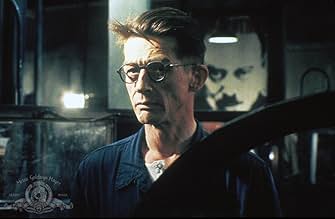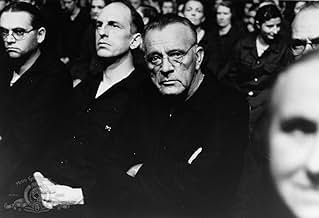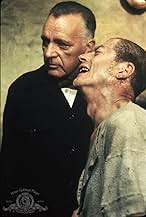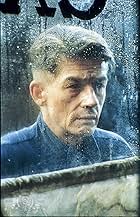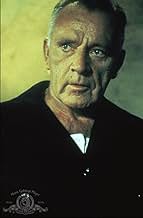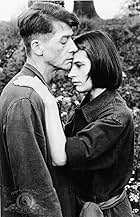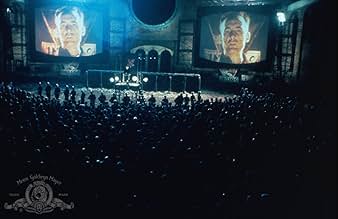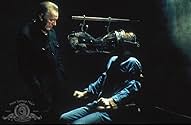In a totalitarian future society, Winston Smith, whose work is re-writing history, tries to rebel. He meets a kindred spirit named Julia and they fall into a love affair.In a totalitarian future society, Winston Smith, whose work is re-writing history, tries to rebel. He meets a kindred spirit named Julia and they fall into a love affair.In a totalitarian future society, Winston Smith, whose work is re-writing history, tries to rebel. He meets a kindred spirit named Julia and they fall into a love affair.
- Director
- Writers
- Stars
- Nominated for 1 BAFTA Award
- 6 wins & 3 nominations total
- Director
- Writers
- All cast & crew
- Production, box office & more at IMDbPro
Featured reviews
But I'm confused by the number of people who have commented that claim to be put off by "the gratuitous nudity" by the two characters of Winston and Julia. Given the fact that everything in this society--waking up, food, habits, desires, work, workers, even the underwear and overalls--is so uniform, has it occurred to viewers that being nude was the only link to identity that these characters had? Everything in their world depends, thrives on sameness. Without clothes, everyone is unique. The two lovers were already in dire conditions by committing the sin of feeling for another human being, let alone carnally but in the heart. And they had to deceive and pretend and go through the motions of the dutiful cogs in the Big Brother wheel. But their only shared peace and comfort was their sacred time alone, and in love. They had finally found their own identities through loving each other. Their nudity was merely symbolic of that. In that sense, their union and expressions of that union only becomes more fragile, beautiful and honest, in such a heartless, cold, indifferent world.
May that be truly said of us, and all of us...
OK, that out of the way...one of the most gritty, realistic, honest translations ever to grace the screen. Wouldn't have changed a thing. Highly, highly recommended, along with the original 1955 version of "Animal Farm". Perfect double-feature for a somber, thoughtful evening's viewing.
The film was obviously a labor of love for director Michael Radford, who also co-wrote the screenplay. As noted in the end credits, the film "was photographed in and around London during the period April-June 1984, the exact time and setting imagined by the author". If this were a big-budget Hollywood bomb, I might consider that a publicity stunt, but in the case of this little-known, little-seen British film, it's fairly obviously a form of homage.
The look of the film is extraordinary in its evocation of the world Orwell created, down to the tiniest detail. Although that world was obviously very different from the real world of 1984, a deliberate choice was made to stick with the Orwellian vision in every way, anachronistic technology and all, and I firmly believe it was the right choice, as opposed to the "updating" we sometimes see in adaptations of classic "futuristic" stories. Thus, we are treated to the baroque and slightly disorienting sight of black rotary-dial telephones, pneumatic document-delivery systems, old-fashioned "safety razors", tube radios, etc., all of which were already obsolete at the time of filming. And of course, the omnipresent black-and-white "telescreens" with rounded picture tubes.
As Winston Smith, the story's protagonist, John Hurt is an inspired piece of casting; absolutely the perfect choice. Not only does he fit the author's description of Smith to a "T", but with the haircut he's given, he even bears a striking resemblance to Orwell himself. And there is no actor alive better than Hurt at evoking victimization in all its infinite gradations and variations. Suzanna Hamilton, relatively little-known here in the US, also does a fine job as Julia. The film also contains the final film appearance of Richard Burton, in one of his most fascinating and disturbing performances as O'Brien. And the great Cyril Cusack does a classic turn as Charrington, the pawnshop proprietor.
Right from the opening scene, in which we look in on a screening of a short propaganda film, brilliantly conceived and executed by Radford, during the daily "two minutes hate", climaxing in Dominic Muldowney's memorable, genuinely stirring national anthem of Oceania played behind the gigantic image of Big Brother, we are catapulted headlong into Orwell's nightmare vision. While not a particularly long novel (my copy is 256 pages), it is nevertheless dense with ideas, and it would be impossible for a standard-length film to include them all, even if the audience could stand all the endless talking heads it would require. Given the inherent limitations, I think the film largely succeeds in preserving a good portion of the ideological "meat" of the novel. It is certainly extremely faithful in the material it does include. Even the incidental music by Eurythmics feels entirely appropriate, and doesn't in any way break the mood. In fact, it even enhances it.
While I thought the 1956 version did a fairly good job for the time, it had a number of flaws in my estimation that made it far less successful an adaptation. For one thing, although the world it portrays is grim, it's not nearly grim enough. Also, Edmond O'Brien may have done a creditable job as Smith, but physically he's all wrong for the part. The portly, even chubby O'Brien bears little resemblance to the slight, emaciated, chronically exhausted, varicose-ulcerated Smith described in the novel. Neither is the 1956 version as faithful to the book; some of the material is softened, and there are odd, unexplainable alterations: O'Brien becomes O'Connor, and I don't think that Goldstein, the possibly imaginary leader of the possibly fictitious "Resistance", is even mentioned. At 90 minutes, it runs a good 23 minutes shorter than the later version, which necessitates the trimming of even more of the novel, for all you literary purists. In all, for me, the 1984 version of "Nineteen Eighty Four" is the definitive version; a remarkably vivid and memorable film.
God forbid!
"1984" is probably one of the most, if not THE most, masterful transitions from book to movie I have ever seen. Easily, its most impressive aspect was its phenomenal accuracy, attention to detail, etc. In other words, this film was FAITHFUL, in every sense of the word, to its source material. One can't give such a statement about films these days.
Amazing casting, terrific musical score, and mind-blowing sets, cinematography, and direction, "1984" is surely a unique treasure, and one that still retains the same timeless messages even decades since its release.
Also, to me at least the missing information made the story feel like it is moving in fast forward. So the pacing felt a bit weird to me.
Personally I enjoyed the film because it put the world and story outside my head. Making me visually look at this twisted world and also experience it from a perspective that's not mine. Which was really interesting.
For these reasons I would recommend all people who read the book watch this movie but definitely not to people who haven't read the book.
Did you know
- TriviaIn poor health during most of the filming, Richard Burton had great difficulty remembering his lines and sometimes had to film a scene dozens of times before he could get it right. The scene in O'Brien's apartment where he is talking to Winston about Goldstein's book took a record of forty-one takes for Burton to say his speech without fumbling his lines.
- GoofsWinston reads a newspaper article titled "INSOC IN RELATION TO CHESS BROTHER WINS." The party name should be spelled "INGSOC."
- Quotes
Winston Smith: [reads from Goldstein's book] "In accordance to the principles of Doublethink, it does not matter if the war is not real, or when it is, that victory is not possible. The war is not meant to be won. It is meant to be continuous. The essential act of modern warfare is the destruction of the produce of human labor. A hierarchical society is only possible on the basis of poverty and ignorance. In principle, the war effort is always planned to keep society on the brink of starvation. The war is waged by the ruling group against its own subjects. And its object is not victory over Eurasia or Eastasia, but to keep the very structure of society intact." Julia? Are you awake? There is truth, and there is untruth. To be in a minority of one doesn't make you mad.
- Crazy creditsThe movie begins with the title, "Who controls the past controls the future. Who controls the present controls the past."
- Alternate versionsFrom director of photography Roger Deakins: "Be careful which '1984' you watch as some do not have the 'Bleach Bypass' effect built in. As the effect was done on all the prints, the IP and subsequent INs do not reflect the intended look of the film."
- ConnectionsFeatured in Eurythmics: Sexcrime (Nineteen Eighty-Four) (1984)
- SoundtracksOceania,'Tis For Thee
Music by Dominic Muldowney
Lyrics by Jonathan Gems
Sung by the London Voices, directed by Terry Edwards
Soprano soloist: Sally Mates
Contralto soloist: Linda Hirst
Conducted by Dominic Muldowney
Details
- Release date
- Countries of origin
- Language
- Also known as
- Neunzehnhundertvierundachtzig
- Filming locations
- Production companies
- See more company credits at IMDbPro
Box office
- Budget
- £3,000,000 (estimated)
- Gross US & Canada
- $8,430,492
- Opening weekend US & Canada
- $29,897
- Dec 16, 1984
- Gross worldwide
- $8,431,544
Contribute to this page



